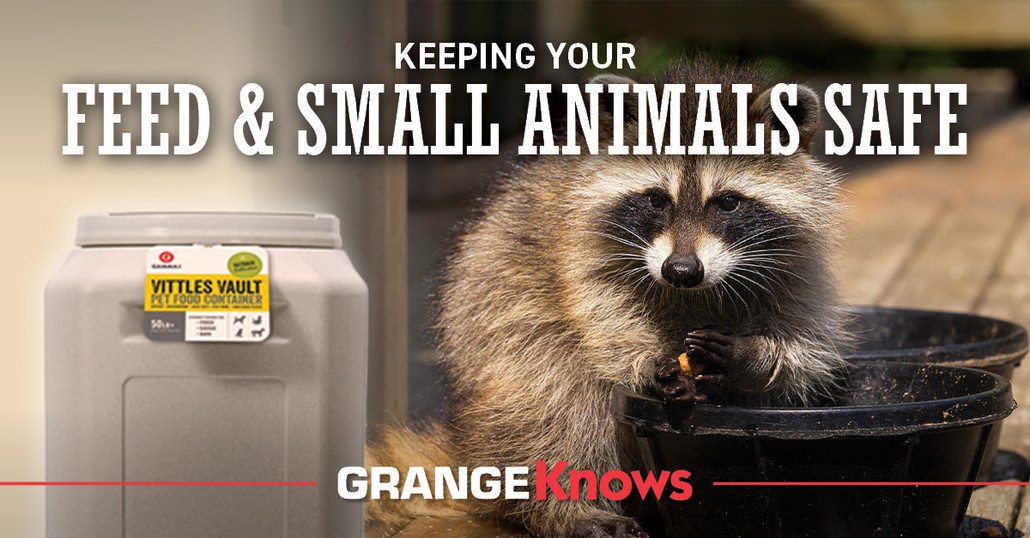
Raccoons — Keeping Your Feed and Small Animals Safe
Posted by Grange Co-op on 8th Dec 2022
Removing Raccoons from the Barn
It isn't surprising that many people prefer to remove raccoons from their barns than try and live with them. Often, catch-and-release traps are the first method of choice. After all, these traps allow you to catch the raccoon without coming into direct contact with it. Then, you can release it into the environment away from your home and the problem is solved.
But this might not be the right solution for you. For one thing, it's against the law in many states, including Oregon, to release a wild animal into a different environment. Before trapping an animal, you must get a permit from the Oregon Department of Fish & Wildlife. Once you catch the animal, you can either release it into the same environment or euthanize it.
Another option is to call animal control to have the animals removed for you. Keep in mind that these professionals follow state laws when removing wildlife. Still, it's better if you can keep the raccoons out of your barn in the first place.
How to Keep Raccoons Out of the Barn
Raccoons have a strong sense of smell, which is what lures them into your barn. There are also many scents that people use to help keep them out, such as:
- Onions
- Garlic
- Cayenne pepper
- Sriracha peppers
- Coffee grounds
- Apple cider vinegar
- Essential oils
If you prefer not to have these odors spread around your feed room, consider using an animal repellent instead. It’s already mixed and ready to spray. Repels-All also helps keep other intruders out of the barn.
Raccoons also hate loud, constant sounds like a radio. They think the voices are humans, so they don’t stay around. Additionally, you can try scarecrows or owls that are designed to scare animals away. Those that move and make noise are the most effective.
Re-Think Your Food Storage System
Depending on the size and number of animals you feed, you might keep your feed in a bucket or barrel. If these containers are left open, it is the perfect opportunity for a hungry raccoon. But covering the top isn't enough to keep the pests out. These crafty critters can climb and twist lids to get to the food. That means you need to store feed in a tightly sealed container that is slick on the sides and doesn't give the raccoons any leverage.
Vittles Vault containers are ideal for storing feed for a variety of animals. They come in a wide range of sizes to accommodate all your needs. To keep raccoons out, keep the lid tight and put the container away from other objects that raccoons can use for leverage. If you use multiple containers, place them at least three feet apart.
When trying to keep raccoons out of your feed storage, it isn't so much about securing the container as it is about limiting access. Raccoons can tear through sheets of metal, reach through holes and unscrew lids, and even remove vice grips! As long as they have a secure place to stand, they can open practically anything. So, to challenge them, you need to make it impossible for them to reach the lid and turn it.
Also, keep your floors swept and free of spilled grain or trash. Raccoons are just as happy to get what they're looking for off the floor as they are fresh from the barrel.
Protecting Small Animals Outdoors
People often see raccoons as predators for the first time after the animals wreak havoc on their chicken coop. Start with a sturdy coop that doesn't allow easy entrance. Put secure latches on the doors and cover the entire structure with hardware cloth. It's much more difficult to tear than regular chicken wire.
Keep your chicken feed in secure containers and, if possible, bring it indoors at night. Don't hang bird feeders nearby either. A raccoon can smell feed from a great distance.
A good fence is key to protecting chickens and other small animals from a raccoon attack. Electric fencing is highly effective at keeping out raccoons and other predators. Regular fencing is often not enough to keep these adept climbers and diggers out. Keeping the electricity turned on at night when raccoons are hunting will protect your chickens without putting them in danger.
Grange Co-op Has What You Need
At Grange Co-op, we have the animal deterrents, electric fencing, feed containers, and animal traps you need to protect your feed and small animals. Often, it takes a multi-faceted approach to keep these pesky animals out for good. Contact us for more information on our products and how they will help you with wild animal control.
